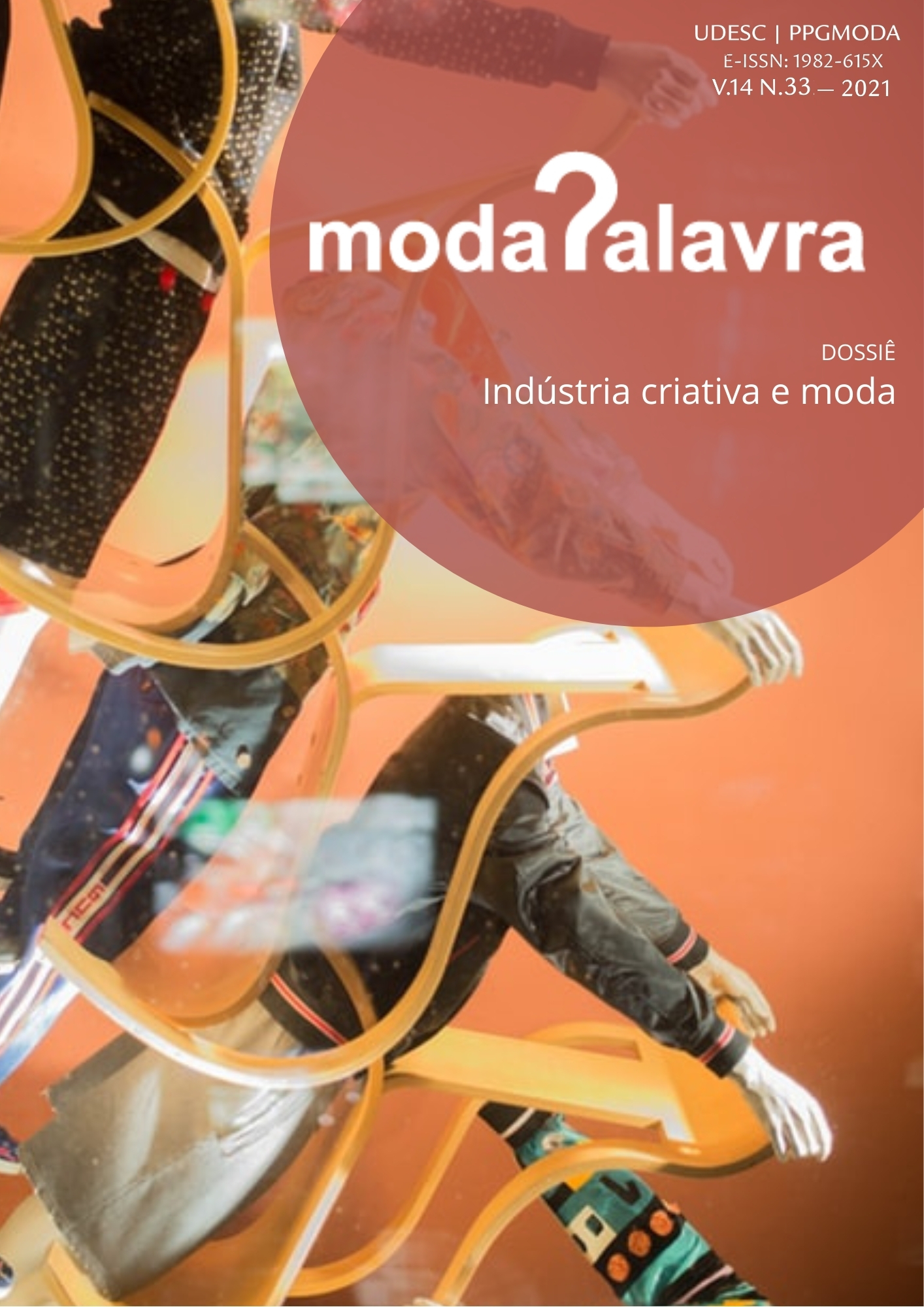Empreendedorismo criativo: as diretrizes do setor de design de moda em Lisboa pela percepção de produtores criativos
DOI:
https://doi.org/10.5965/1982615x14332021058Palavras-chave:
economia criativa, design, LisboaResumo
O estudo apresentado tem por objetivo levantar questões quanto a percepção de produtores criativos e de sua capacidade em participar e se adaptar ao modelo de economia emergente, pautada no desenvolvimento de criatividade e processos autorais de criação de produtos. Para tanto, levou-se em consideração as transformações observadas ao longo da última década, e que apresentaram Lisboa com uma cidade com potencial para tornar-se expoente em inovação e empreendedorismo criativo. A partir de levantamentos documentais de índices econômicos recentes e identificação de iniciativas, marcas e produtores autorais, foram verificados alguns dos fatores que favoreceram o desenvolvimento do setor. Os dados que compõem a pesquisa foram fundamentados em entrevistas com designers empreendedores, cujos discursos forneceram material para posterior análise. A análise da perspectiva dos profissionais participantes na pesquisa aponta para fatores responsáveis pelos processos que contribuíram para a reestruturação da economia.
Downloads
Referências
Associação Industrial do Distrito de Aveiro. Recomendação Europeia de Definição de Pequenas e Médias Empresas. Disponível em: http://aida.pt/cms/media/pdf/definicao_europeia_pme.pdf. Acesso em: 9 jun. 2018
BAKHTIN, M. Marxismo e Filosofia da linguagem. 8. ed. São Paulo: Hucitec, 1997.
BAUMAN, Z. Vida para o consumo: a transformação das pessoas em mercadoria. Rio de Janeiro: Zahar, 2008.
Câmara Municipal de Lisboa. Iniciativas voltadas para Economia Criativa. Disponível em: http://www.cm-lisboa.pt/investir/setores-estrategicos/economia-criativa. Acesso em: 8 maio 2018.
Câmara Municipal de Lisboa. Centro de Inovação da Mouraria. Disponível em: http://www.cm-lisboa.pt/centro-de-inovacao-da-mouraria-mouraria-creative-hub. Acesso em: 22 jun. 2018.
Comissão Europeia. Cultural and Creative Cities Monitor. Disponível em: https://composite-indicators.jrc.ec.europa.eu/cultural-creative-cities-monitor/. Acesso em: 3 maio 2018.
FLORIDA. R. A ascensão da classe criativa. Porto Alegre: L&PM, 2011.
GIL, A. C. Métodos e técnicas de pesquisa social. São Paulo: Atlas, 2012.
HOWKINS, J. The Creative Economy: how people make money from ideas. London: Penguin Books, 2001.
Instituto Nacional de Estatísticas. Estatísticas de Cultura 2016. Disponível em: www.gepac.gov.pt/estatisticas-e-estudos/estatisticas.aspx. Acesso em: 8 maio 2018.
MARGOLIN, V.; MARGOLIN, S. Um modelo social de design: questões de prática e pesquisa. Revista Design em Foco, v. 1, p. 43–48, 2004.
NEWBIGIN, J. A economia criativa: um guia introdutório. Londres: British Council, 2010.
Organização das Nações Unidas. Conferência das Nações Unidas sobre Comércio e Desenvolvimento. The Creative Economy Report. Disponível em: http://unctad.org/pt/docs/ditctab20103_pt.pdf 2010. Acesso em 19 fev. 2018.
ORLANDI, E. P. Análise de Discurso: princípios e procedimentos. Campinas, SP: Pontes, 3. ed., 2001.
RICHARDSON, R. J. Pesquisa Social: métodos e técnicas. 3. ed. São Paulo: Atlas, 2009.
WHITELEY, N. Design for society. Londres: Reaktion Books, 1993.
Downloads
Publicado
Como Citar
Edição
Seção
Licença
Copyright (c) 2021 Maria Débora Fernandes Pontes, Maria Alice Vasconcelos Rocha, Hans da Nóbrega Waechter

Este trabalho está licenciado sob uma licença Creative Commons Attribution-NonCommercial 4.0 International License.
Ao submeter um artigo para publicação no ModaPalavra e-periódico, o(s) autor(es) concorda(m) com os seguintes termos:
- Autores mantêm os direitos autorais e concedem à revista o direito de primeira publicação, com o trabalho simultaneamente licenciado sob a Creative Commons Atribuição-NãoComercial 4.0 Internacional, que permite o compartilhamento do trabalho com reconhecimento da autoria e publicação inicial nesta revista, sem pagamento;
- Os autores podem utilizar os mesmos resultados em outra publicações após a primeira publicação, desde que indiquem o ModaPalavra e-periódico como o meio de publicação original;
- Autores têm autorização para assumir contratos adicionais separadamente somente após a publicacão inicial no ModaPalavra e-periódico, desde que indiquem o ModaPalavra e-periódico como o meio de publicação original;
- Autores têm permissão e são estimulados a publicar e distribuir seu trabalho on-line (ex.: em repositórios institucionais ou na sua página pessoal), somente após o processo editorial e primeira publicação, desde que indiquem o ModaPalavra e-periódico como o meio de publicação original;
- Para indicar o ModaPalavra e-periódico como o meio de publicação original, o autor deve seguir texto modelo: "Este artigo foi publicado originalmente pelo ModaPalavra e-periódico, sob a licença CC BY NC, em seu volume [inserir volume], número [inserir número] no ano de [inserir ano], e pode ser acessado em: http://www.revistas.udesc.br/index.php/modapalavra/";
- As opiniões expressas nos artigos são de inteira responsabilidade dos autores, não refletindo necessariamente a opinião da revista. A publicação de artigos, fotos e desenhos foi autorizada previamente pelos responsáveis ou seus representantes para publicação no ModaPalavra e-periódico.









